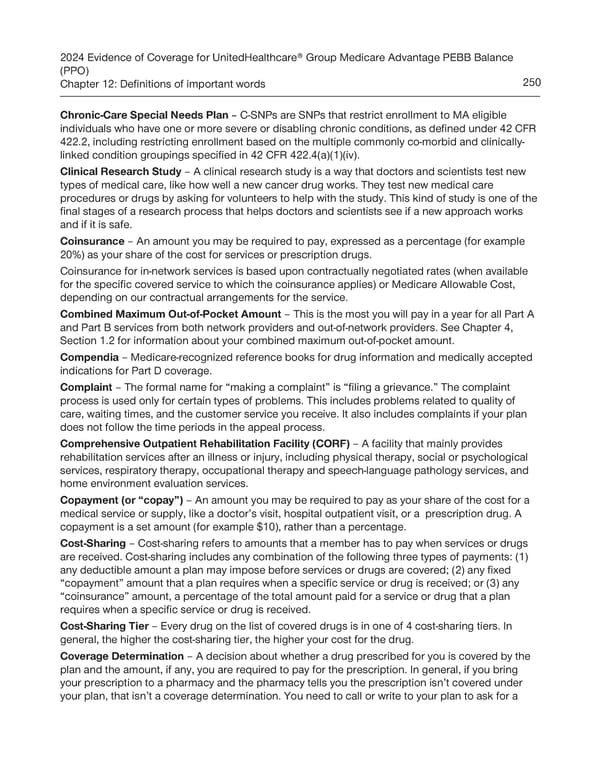2024 Evidence of Coverage for UnitedHealthcare® Group Medicare Advantage PEBB Balance (PPO) Chapter 12: Definitions of important words 250 Chronic-Care Special Needs Plan – C-SNPs are SNPs that restrict enrollment to MA eligible individuals who have one or more severe or disabling chronic conditions, as defined under 42 CFR 422.2, including restricting enrollment based on the multiple commonly co-morbid and clinically- linked condition groupings specified in 42 CFR 422.4(a)(1)(iv). Clinical Research Study – A clinical research study is a way that doctors and scientists test new types of medical care, like how well a new cancer drug works. They test new medical care procedures or drugs by asking for volunteers to help with the study. This kind of study is one of the final stages of a research process that helps doctors and scientists see if a new approach works and if it is safe. Coinsurance – An amount you may be required to pay, expressed as a percentage (for example 20%) as your share of the cost for services or prescription drugs. Coinsurance for in-network services is based upon contractually negotiated rates (when available for the specific covered service to which the coinsurance applies) or Medicare Allowable Cost, depending on our contractual arrangements for the service. Combined Maximum Out-of-Pocket Amount – This is the most you will pay in a year for all Part A and Part B services from both network providers and out-of-network providers. See Chapter 4, Section 1.2 for information about your combined maximum out-of-pocket amount. Compendia – Medicare-recognized reference books for drug information and medically accepted indications for Part D coverage. Complaint – The formal name for “making a complaint” is “filing a grievance.” The complaint process is used only for certain types of problems. This includes problems related to quality of care, waiting times, and the customer service you receive. It also includes complaints if your plan does not follow the time periods in the appeal process. Comprehensive Outpatient Rehabilitation Facility (CORF) – A facility that mainly provides rehabilitation services after an illness or injury, including physical therapy, social or psychological services, respiratory therapy, occupational therapy and speech-language pathology services, and home environment evaluation services. Copayment (or “copay”) – An amount you may be required to pay as your share of the cost for a medical service or supply, like a doctor’s visit, hospital outpatient visit, or a prescription drug. A copayment is a set amount (for example $10), rather than a percentage. Cost-Sharing – Cost-sharing refers to amounts that a member has to pay when services or drugs are received. Cost-sharing includes any combination of the following three types of payments: (1) any deductible amount a plan may impose before services or drugs are covered; (2) any fixed “copayment” amount that a plan requires when a specific service or drug is received; or (3) any “coinsurance” amount, a percentage of the total amount paid for a service or drug that a plan requires when a specific service or drug is received. Cost-Sharing Tier – Every drug on the list of covered drugs is in one of 4 cost-sharing tiers. In general, the higher the cost-sharing tier, the higher your cost for the drug. Coverage Determination – A decision about whether a drug prescribed for you is covered by the plan and the amount, if any, you are required to pay for the prescription. In general, if you bring your prescription to a pharmacy and the pharmacy tells you the prescription isn’t covered under your plan, that isn’t a coverage determination. You need to call or write to your plan to ask for a
 UnitedHealthcare PEBB Balance EOC (2024) Page 255 Page 257
UnitedHealthcare PEBB Balance EOC (2024) Page 255 Page 257